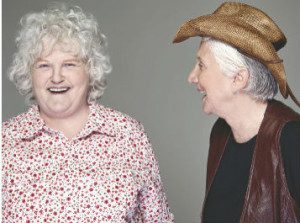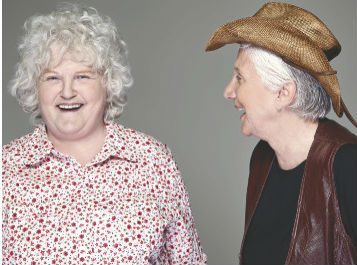Olympia Dukakis admits she’s rebellious. In fact, these days the popular stage and screen actor sounds a lot like her character in Cloudburst, a butch lesbian named Stella.
“My career? I’m 82 years old—what do I give a shit about ‘career,’ ” wails one of entertainment’s grande dames.
Dukakis has had a long and distinguished career, which includes her Academy Award–winning performance in Moonstruck. But she is passionate about Cloudburst, an independent lesbian-themed film that was released on DVD in July.
“There’s a scene where you see the price she pays for that rebelliousness,” Dukakis says of Stella. “It was shocking to me, shocking. Because I have that in my own nature, as you can probably tell. I don’t take things—sit down and shut up. What’s interesting is that I saw that, and I saw that in myself.”
Dukakis isn’t shy about issues close to her heart, or about her politics. (Her cousin Michael Dukakis is a former governor, and was the Democratic nominee for president in 1988.)
In Cloudburst, she teams up with fellow Oscar-winner Brenda Fricker, who plays Dot. Stella and Dot’s life commitment is threatened when age and health issues make them vulnerable to outsiders. Unfortunately, it’s an all-too familiar scenario for LGBT couples.
Stella’s outspokenness only gets in the way as she tries to take control of the life she and Dot have built over 31 years. Dot’s granddaughter tries to remove Dot from that relationship, and remove Stella from the home that she and Dot share.
Some Americans might be surprised to learn that federal courts have often sided with family members over the wishes of gay and lesbian couples, even if the couple’s wishes are stated in a will or a trust (which is one reason why the Supreme Court ruling on gay marriage is so important).
Cloudburst, based on a play by Thom Fitzgerald, attracted the two veteran actors because they loved the script and had both worked with Fitzgerald before.
“We enjoyed working together, and, to tell you the truth,” says Dukakis sincerely, “I really trust him. He said to me, ‘The rebelliousness and the price [Stella] paid, that’s all you, Olympia.’ I thought, Yes, he’s right, that is. It’s the first time I’ve seen that in myself. So it was an extraordinary experience for me, the whole thing.”
Fitzgerald directed Dukakis in The Event (2003), about New York’s gay population, and in 3 Needles (2005), in which she plays a nun dealing with the spread of HIV/AIDS in Africa. In Cloudburst, Stella dresses in flannel and speaks her often-dirty mind. But she’s attentive and loving to Dot, her blind, more timid life-partner.
Stella springs Dot from an old-folks facility, and they hightail it to Canada to get married. They pick up a young hitchhiker (Ryan Doucette) who, disowned by his own family, becomes a co-conspirator, friend and ultimately chosen family.
The script has some sad and disturbing moments and many hilarious ones. One of Stella’s stories is brash enough to get her kicked out of a man’s car. (He assuming she is a helpless old lady, a persona she pulls off using a headscarf as a prop). In another scene, Stella explains her “last meal” in graphic terms—if, hypothetically, she found herself on death row.
That fantasy involves k.d. lang (whose music is also heard in the film), so I asked Dukakis if she’d ever heard from lang about their “meal” together. Dukakis said she had not. But they did meet once.
“I actually went up to her in a restaurant in L.A.,” she recalls. “I saw her sitting at a table with somebody. I so admired her singing. I went up and introduced myself. And she was very nice and polite, but I was obviously interrupting a romantic interlude there, so I didn’t stay too long.”
 Dukakis isn’t happy that Cloudburst isn’t getting theatrical distribution in the U.S.
Dukakis isn’t happy that Cloudburst isn’t getting theatrical distribution in the U.S.
“You can’t get a film like Cloudburst in theaters in the United States? Look, this is the country we’re living in, you can’t get that film distributed?” she says with indignation. “It played for 10 weeks in Toronto!”
Dukakis has loved the story from the start. “I thought it was a love story. I liked this character. I liked the genuineness, her willingness to confront things, and I was moved by the price she paid for how she wanted to live and what she had to do.”
She had no problem with Stella’s colourful vocabulary, which goes from the S-word to the F-word to the C-word. “I had a great time doing it, I loved doing it,” she says. “I’ve done a lot of things that were about nothing. Just to have a good time, whatever, just making a buck. But I also make sure I do parts that are about something.”
This film, she says proudly, is “about something,” as evidenced by the feedback she’s received. “It means a great deal to me that it’s affected people,” she says. It reminds her of the groundbreaking 1990s PBS series Tales of the City, in which she plays a male-to-female transgender character.
“I had a similar experience then. It does matter to me—a lot,” she says. “Especially the younger women, the lesbian women, the understanding of what came before them and how women were treated, and how they had to live, how they had to hide.” Dukakis even sent the script to lesbian friends her own age who had experienced rejection from their families and “lived their whole life without talking about it. … Not that, that doesn’t happen today, it does, but then it happened much more, much more.”
She has no fear that playing a rude and crude lesbian will tarnish her good name. “I stopped worrying about my career when I was 60 or something,” she says. “We joke about it, my husband and I. Was this is a good career move? People talk about careers going up and down, mine just moves to the side. I go here, then I go do this. Then I had three kids, you know? My career is a part of my life, it wasn’t my life.”
